Nakayama is in between Narita And Haneda International Airport
<クッキーについての同意並び欧州居住者向けプライバシーポリシー>
中山・下総・散歩道
The Yonsokumon Gate In Nakayama Hokekyoji
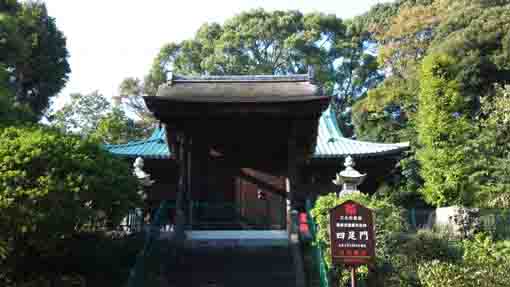
Yonsokumon Gate in Nakayama Hokekyoji Temple is standing on the center of a small hill on the west of Soshido Hall. Hokkedo Hall is behind the gate. The views of them look that Nakayama Hokekyoji could had been in its beginning. Of course, it is just imagination, it is not so far as Nakayama Hokekyoji was built in Kamakura and Yonsokumon and Hokkedo was built in Muromachi Period. Moreover, according to the sign board beside the gate, Yonsokumon was moved from Aizendo in Kamakura, and Nichirenshu Kakuhonzan Meisho Zue (a guide book describing some headquater templss of Nichiren Sect) tells that Yoritsuna Taira said that he would build Aizendo in the western part of Kamakura. Though there is no adequate information whether it was built or not, it is an exciting place to see some old buildings built in the middle ages in Japan. Plum and azalea blossoms on the hill bloom and paint some buildings around them. Why don't you visit it?
Hokekyoji Yonsokumon Gate
Hokekyoji Yonsokumon Gate; The Important Cultural Property Designated by National Government
Date of Designation; May 24th of Taisho 5th (1916)Date of Construction; Late Muromachi Period
Architectural Structure; Four-pillar Gate with hip-and-gable roofing covered with shingles only
The four pillar gate is called Yonsoku-mon, means that the gate has four legs. It was told that the gate might be that of Aizen-do at Kamakura in Kanagawa Prefecture moved to here in Nakayama. First it used to be the main gate to the main hall in Hokekyo-ji Temple. In Meiji Era, it was set on the place now on. Considering of the architectural structure, it seemed to be built in late Muromachi Period.
This gate is built with purely Zen-Sect style. The gate was designed with very rare structure that the main pillar stretched out nearly to the ridge and sub pillars stood on the both back and forth of the it are joined with the strong carved beam called Rainbow-shaped tie beams. There are no gate seen in Japan like this unique pillar that the shape of it is ellipse in section.
In addition, the gate with decorated with many sculptures is another feature, it presents well patterns and shapes on were frequently used each in late Muromachi Period. The decorations carved to be seen from the front only, therefore this gate originally connected with walls on both side. And Japanese style flat windows were adopted in its fixture to be given structural change. The pillars and beams were made with zelkova, and others were with hinoki cypress, cedar and cherry wood.
The Yonsoku-mon gate was tore down and repaired in Showa 10th (1935) and almost all materials used on it were changed new one, but some materials could be used on were reused in it to restore the cultural property as possible as its original.
March 1999 Ichikawashi Board of Education
法華経寺四足門脇掲示板により
Yonsokumon Gate in spring
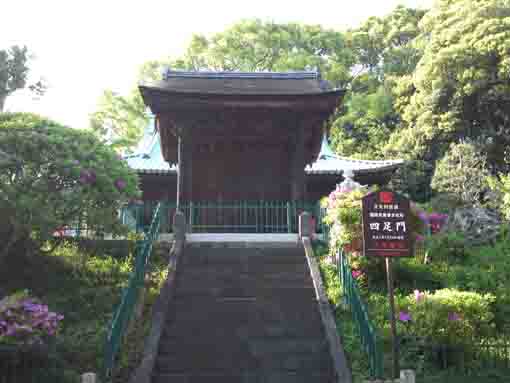
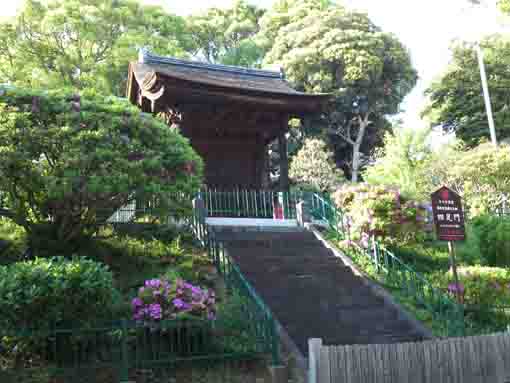
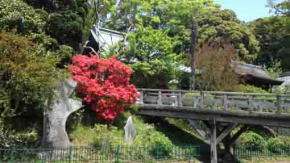
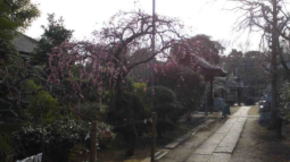
引用・抜粋および参考
法華経寺法華堂前案内板
市川市ホームページ
市川市立図書館ホームページ
正中山法華経寺誌
日蓮宗各本山名所図会
大辞林
日本世界人名辞典
新制版 日本史辞典
ブリタニカ国際大百科事典
ウィッキペディア
The Access to Yonsokumon Gate In Nakayama Hokekyoji
Yonsokumon Gate In Nakayama Hokekyoji Temple
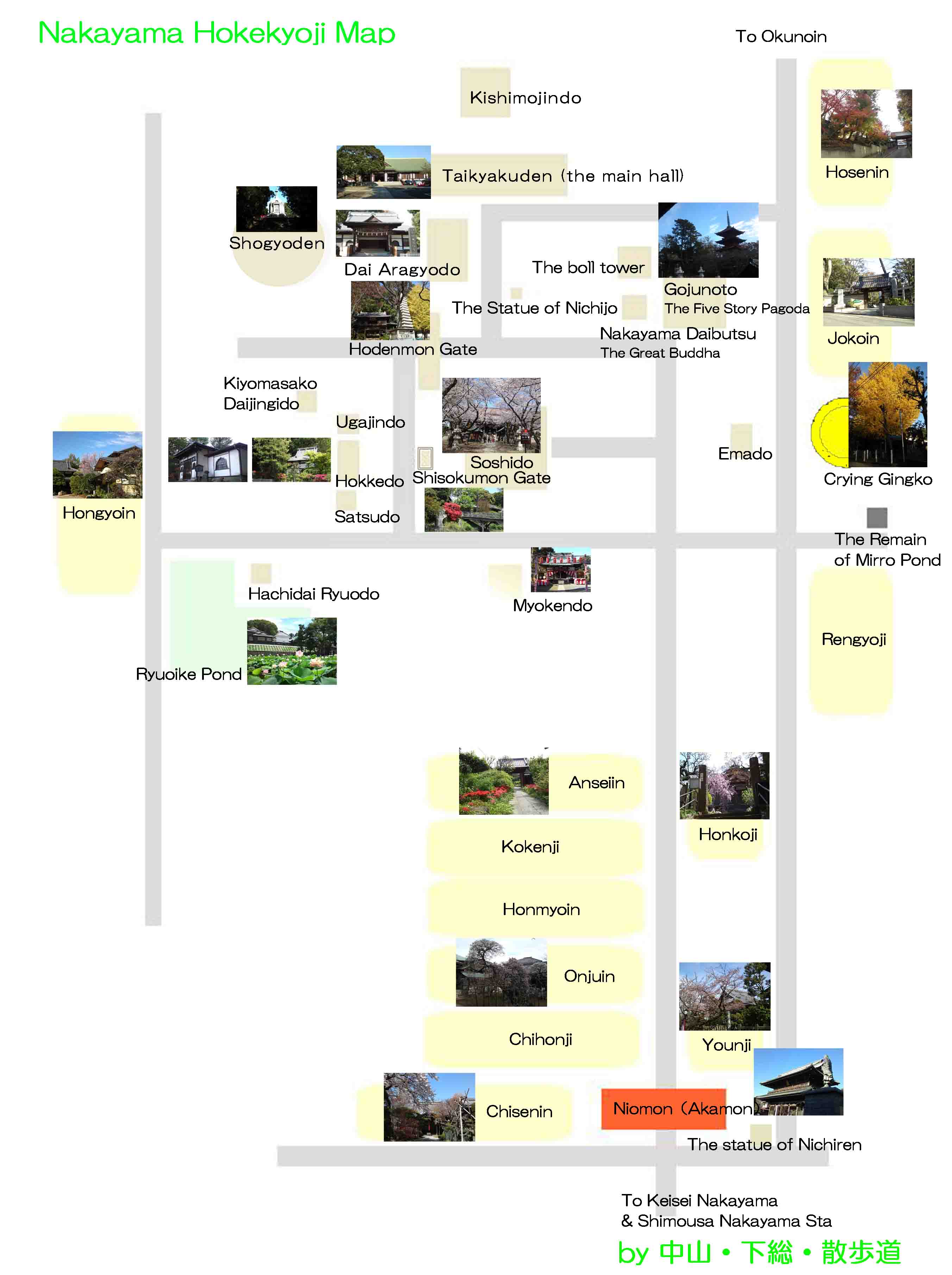
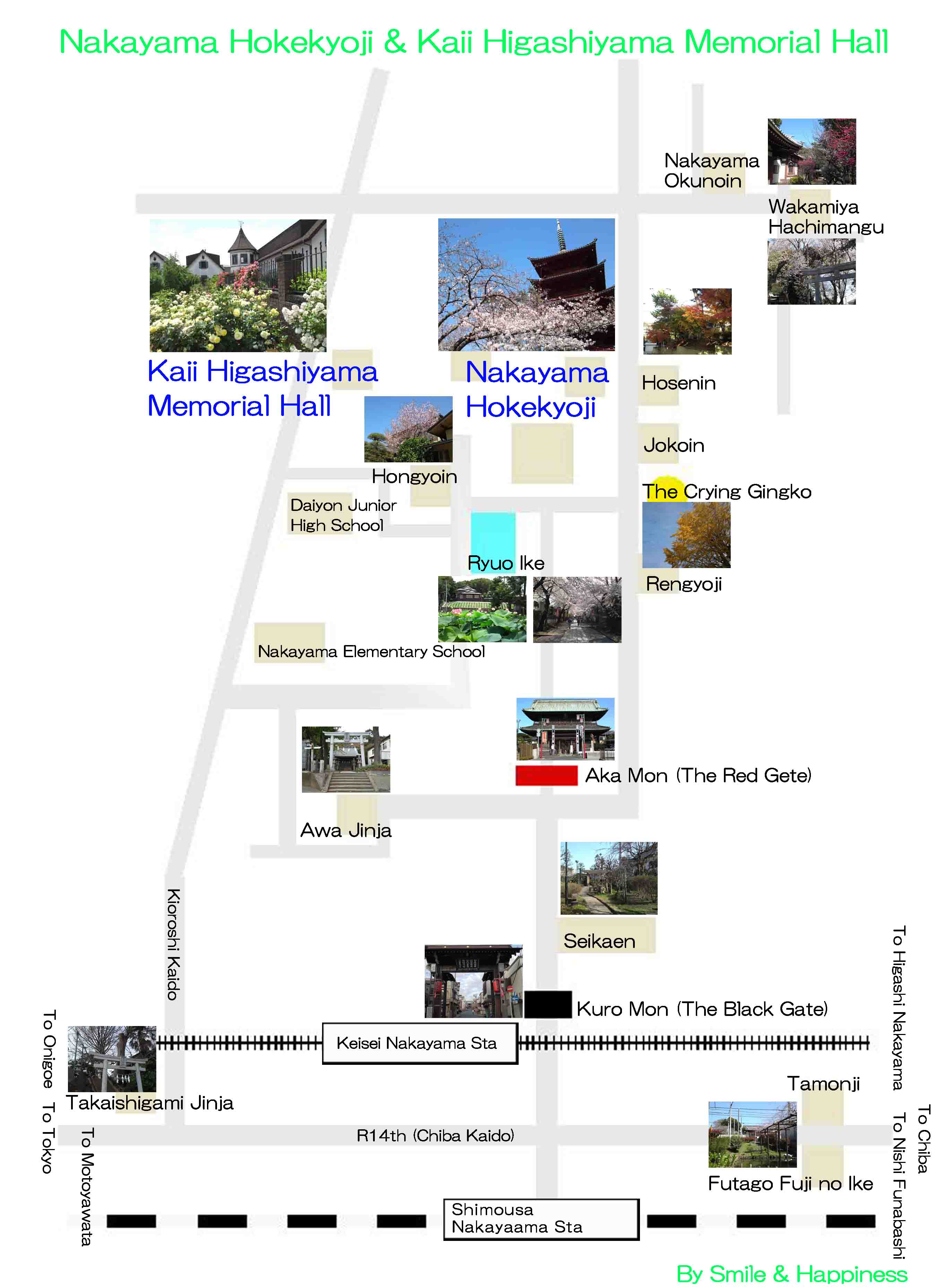
The map near Nakayama Hokekyoji and Kaii Higashiyama Memorial Hall
PDF of the map near Hokekyoji and Kaii Higashiyama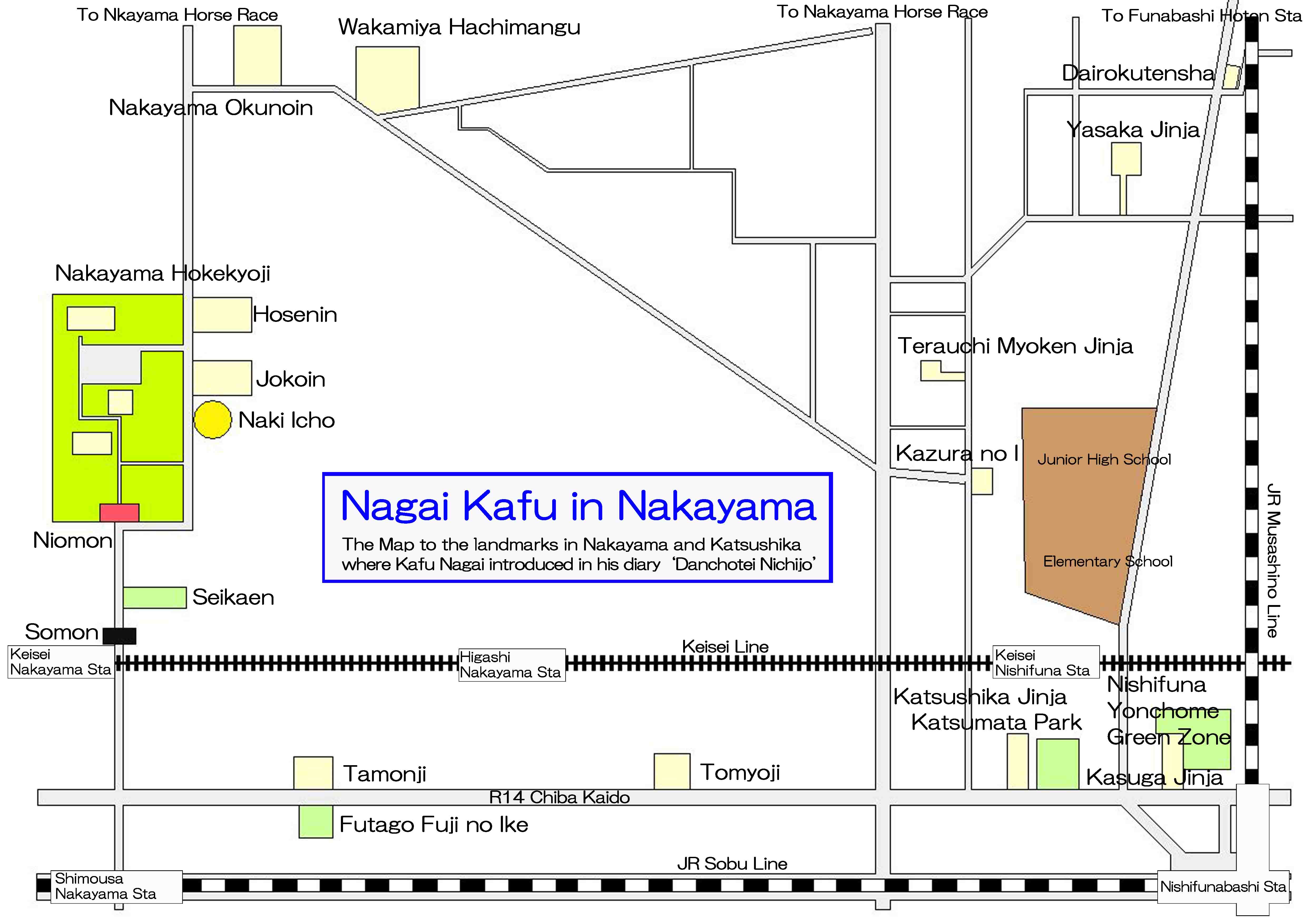
The map to the landmarks where Kafu Nagai introduced in his book
PDF of the map of the noted spots where Kafu Nagai visited- Yonsokumon Gate in Nakayama Hokekyouji Temple has great accessibilities from both Narita and Haneda International Airport.
- From Narita International Airport, take Keisei-line and get off Keisei-Nakayama Sta, take minimally 40 minutes from Narita Airport.. And also take JR Sobu-express line, transfer the line at Funabashi to Sobu-Local line, get off Shimousa-Nakayama Sta.
- From Haneda International Airport, take Keikyu-line bound to Narita, and get off Keisei-Nakayama Sta.
- From Tokyo Sta, take Sobu-Express line bound to Chiba or Narita, transfer the line to Sobu-Local line bound to Chiba, Tsudanuma, or Nishi-Funabashi at Ichikawa Sta, get off Shimousa-Nakayama Sta.
- From Akihabara Sta, take Sobu line bound to Chiba, get off Shimousa-Nakayama Sta.
- Take 5 minute walk from Keisei-Nakayama Sta, and take 8 minutes walk from Shimousa-Nakayama Sta.
- 2-10-1 Nakayama, Ichikawa-shi, Chiba-pref, Japan
Sightseeing in Nakayama Shomousa With Mangas
Sightseeing in Nakayama Hokekyoji Temple with Manga (Long Version)
Sightseeing in Nakayama Hokekyoji Temple with Manga (Short Version)
The Landmarks in Nakayama Hokekyouji Temple
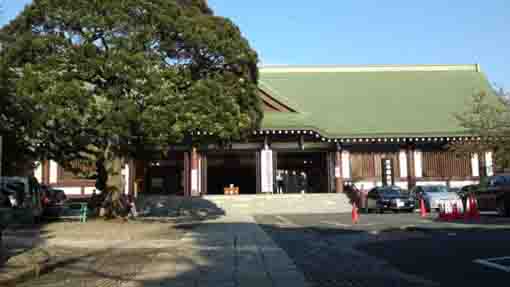
Honin(Taikyakuden)・Kishibojindo(Sonshindo)
Takikyakuden is the main hall of Hokekyoji and it has the business office and Kishibojindo Hall dedicated to the goddess of children on the end of the long corrido of the main hall.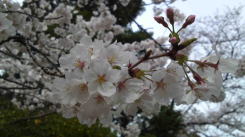
The Four Seasons In Hokekyoji
In spring, there is millions of cherry blossoms in Hokekyoji and in summer, lotus blooms on ryuo-ike pond. In fall, there are beautiful colored leaves. Every season, visitors could enjoy seeing the sights.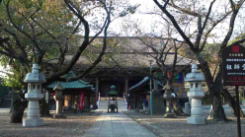
Soshido(Daido), the nationally important cultural property
It is characterized the twin hip-and-gable roof structure (hiyoku-irimoya-style), and hengaku written by Koetsu Honami hangs in front.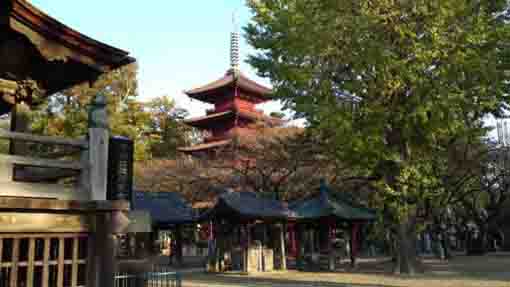
Goju-no-to (the five-story pagoda) , the nationally important cultural property
It was built in early Edo period (1622) by request of Koshitsu Honami supported by Maeda Family in Kaga.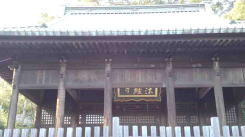
Hokke-do(the nationally important cultural property)
It was built in Kamakura period.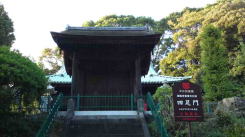
Yon-soku-mon (the nationally important cultural property)
It was moved from Aizen-dou in Kamakura 700 years ago.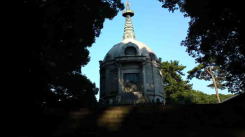
Shougyoden (the treasure hall)
It was designed by the famous architect Chuta Ito, it stores many scripts written by the Founder Nichiren.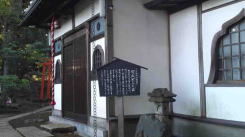
Shogan-jyoujyu-kigan-do (kiyomasa-kou-dai-zingi-do)
It enshrines Kiyomasa Kato, one of the most famous daimyo in Sengoku period.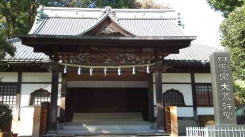
Aragyodo Hall (the hall where Buddhiist priests practice for 100 days in winter severly)
From Nov 1 to Feb 10, hundreds of Buddhist priests practice severly every year.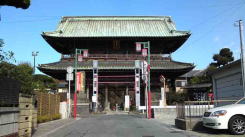
The Nio-mon Gate (The Deva Gate)
The henguku hunged in front of the gate was written by Koetsu Honami, famous artist in Momoyama Period.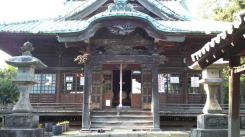
Setsu-do
It was built for worshipping Jurasetsunyo, Kishibozin, Daikokusama.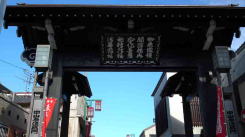
Black Gate(a tangible cultural asset by Ichikawa City)
It is also called Sou-mon (the main gate).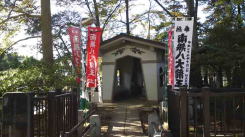
Hachidai-ryuo-do
The founder Nichiren built the small shrine to dedicate the dragon god to pray for rain.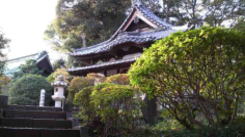
Ugazin-do
It enshrins Ugazin who is the guardian deity of Hokekyou-ji Temple.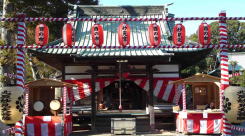
Myouken-do
It dedicates Hokushin Myouken Star that the Chiba Family deeply believed in, Hokekyoji traditionally succeeds. In November, Tori-no-ich is held in the site to dedicate the star.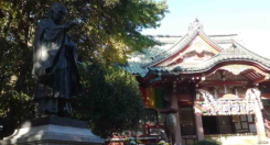
Oku-no-in (the first place where Nichren had preached at)
The founder Nichiren preached first time at the Toki's castle called Wkakamiya Yakata. And Toki built a temple 'Hokkeji', it is the origin of Oku no In.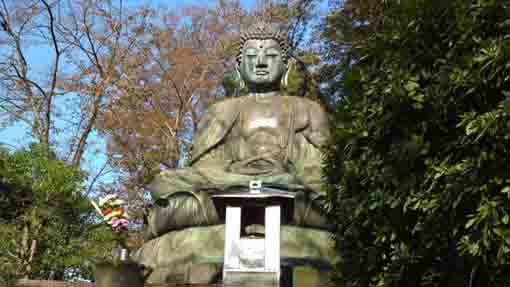
The Great Buddha(The Seated Statue of Shaka Nyorai)
It was built in 1719 by famous caster Ota Suruga-no-kami in Kanda. It is the bigest great Buddha in Chiba prefecture.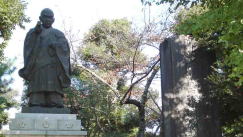
The statue of Nichijo and Naki-Icho
Nichijo was the first abbot of Nakayama Hokekyoji Temple and Naki Icho is a gingko tree having a sad legend.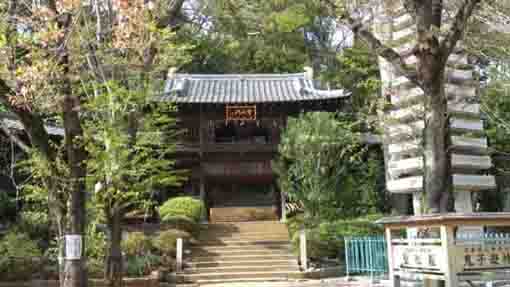
Kagami-ike-ato (the remain of the pond like a mirror), Emado hall, Hoden-mon gate, Ryuenkyo bridge
There are some other landmarks in Nakayama Hokekyoji Temple.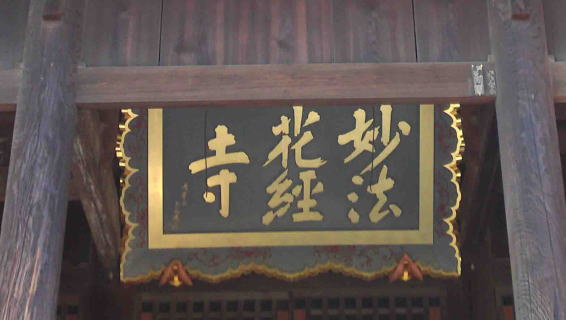
The artists, poets and writers related to Hokekyoji Temple
Koetsu Honami specially remained his calligraphy in Hokekyo-ji Temple, and Shiki Masaoka, Kafu Nagai discribed it well.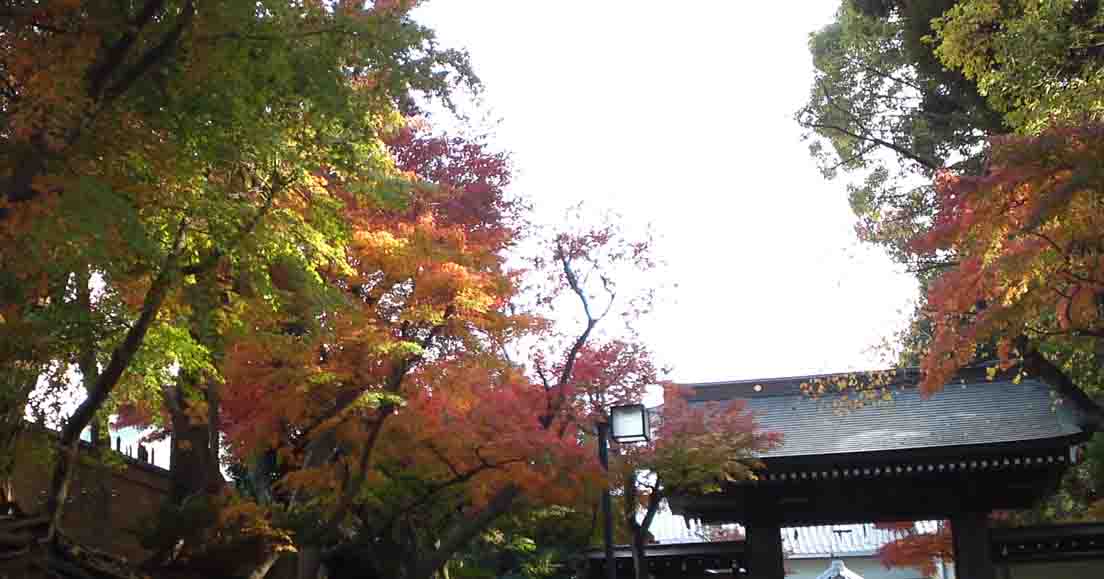
The Tacchu Temples and the Branch Temples in and around Nakayama Hokekyoji Temple
Some tacchue temples are introduced in this page.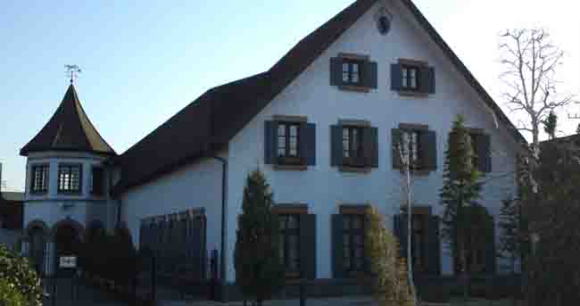
A Walk on the the area around Nakayama Hokekyoji Temple
There are some noted spots, Kaii Higashiyama Memorial Hall and so on, near Hokekyoji.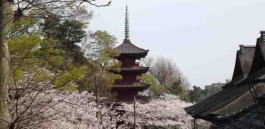
The Popular Viewing Sakura Spot / Nakayama Hokekyoji Temple
Cherry blossoms in Hokekyoji are amazingly wonderful.- 広告 Advertisement -
